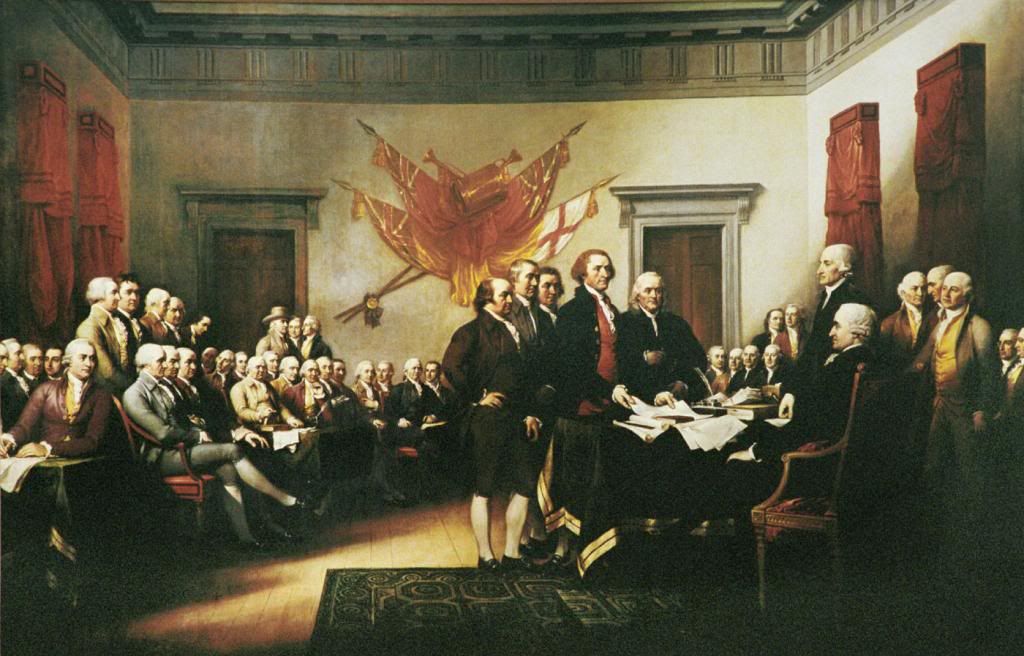Thursday, July 4, 2013
The Signers....
A NOTE ON THE SIGNERS OF
THE DECLARATION OF INDEPENDENCE
by Matthew Spalding, Heritage Foundation
"...we mutually pledge to each other our Lives, our Fortunes and our
sacred Honor."
(Each year information about those who signed the Declaration of
Independence is circulated, not all of which is accurate. The
following note is based on research in several established sources,
which are noted below.)
Fifty-six individuals from each of the original 13 colonies
participated in the Second Continental Congress and signed the
Declaration of Independence. Pennsylvania sent nine delegates to the
congress, followed by Virginia with seven and Massachusetts and New
Jersey with five. Connecticut, Maryland, New York, and South
Carolina each sent four delegates. Delaware, Georgia, New Hampshire,
and North Carolina each sent three. Rhode Island, the smallest
colony, sent only two delegates to Philadelphia.
Nine of the signers were immigrants, two were brothers, two were
cousins, and one was an orphan. The average age of a signer was 45.
The oldest delegate was Benjamin Franklin of Pennsylvania, who was
70 when he signed the Declaration. The youngest was Thomas Lynch,
Jr., of South Carolina, who was 27.
Eighteen of the signers were merchants or businessmen, 14 were
farmers, and four were doctors. Forty-two signers had served in
their colonial legislatures. Twenty-two were lawyers -- although
William Hooper of North Carolina was "disbarred" when he spoke out
against the Crown -- and nine were judges. Stephen Hopkins had been
Governor of Rhode Island.
Although two others had been clergy previously, John Witherspoon of
New Jersey was the only active clergyman to attend -- he wore his
pontificals to the sessions. Almost all were Protestant Christians;
Charles Carroll of Maryland was the only Roman Catholic signer.
Seven of the signers were educated at Harvard, four each at Yale and
William & Mary, and three at Princeton. John Witherspoon was the
president of Princeton and George Wythe was a professor at William &
Mary, where his students included the author of the Declaration of
Independence, Thomas Jefferson.
Seventeen of the signers served in the military during the American
Revolution. Thomas Nelson was a colonel in the Second Virginia
Regiment and then commanded Virginia military forces at the Battle
of Yorktown. William Whipple served with the New Hampshire militia
and was one of the commanding officers in the decisive Saratoga
campaign. Oliver Wolcott led the Connecticut regiments sent for the
defense of New York and commanded a brigade of militia that took
part in the defeat of General Burgoyne. Caesar Rodney was a Major
General in the Delaware militia and John Hancock was the same in the
Massachusetts militia.
Five of the signers were captured by the British during the war.
Captains Edward Rutledge, Thomas Heyward, and Arthur Middleton
(South Carolina) were all captured at the Battle of Charleston in
1780; Colonel George Walton was wounded and captured at the Battle
of Savannah. Richard Stockton of New Jersey never recovered from his
incarceration at the hands of British Loyalists and died in 1781.
Colonel Thomas McKean of Delaware wrote John Adams that he was
"hunted like a fox by the enemy -- compelled to remove my family
five times in a few months, and at last fixed them in a little log
house on the banks of the Susquehanna . . . and they were soon
obliged to move again on account of the incursions of the Indians."
Abraham Clark of New Jersey had two of his sons captured by the
British during the war. The son of John Witherspoon, a major in the
New Jersey Brigade, was killed at the Battle of Germantown.
Eleven signers had their homes and property destroyed. Francis
Lewis's New York home was destroyed and his wife was taken prisoner.
John Hart's farm and mills were destroyed when the British invaded
New Jersey and he died while fleeing capture. Carter Braxton and
Thomas Nelson (both of Virginia) lent large sums of their personal
fortunes to support the war effort, but were never repaid.
Fifteen of the signers participated in their states' constitutional
conventions, and six -- Roger Sherman, Robert Morris, Benjamin
Franklin, George Clymer, James Wilson, and George Reed --signed the
United States Constitution. Elbridge Gerry of Massachusetts attended
the federal convention and, though he later supported the document,
refused to sign the Constitution.
After the Revolution, 13 of the signers went on to become governors,
and 18 served in their state legislatures. Sixteen became state and
federal judges. Seven became members of the United States House of
Representatives, and six became United States Senators. James Wilson
and Samuel Chase became Justices of the United States Supreme Court.
Thomas Jefferson, John Adams, and Elbridge Gerry each became Vice
President, and John Adams and Thomas Jefferson became President. The
sons of signers John Adams and Benjamin Harrison also became
Presidents.
Five signers played major roles in the establishment of colleges and
universities: Benjamin Franklin and the University of Pennsylvania;
Thomas Jefferson and the University of Virginia; Benjamin Rush and
Dickinson College; Lewis Morris and New York University; and George
Walton and the University of Georgia.
John Adams, Thomas Jefferson, and Charles Carroll were the longest
surviving signers. Adams and Jefferson both died on July 4, 1826,
the 50th anniversary of the Declaration of Independence. Charles
Carroll of Maryland was the last signer to die -- in 1832 at the age
of 95.
(Sources: Robert Lincoln, Lives of the Presidents of the United
States, with Biographical Notices of the Signers of the Declaration
of Independence (Brattleboro Typographical Company, 1839); John and
Katherine Bakeless, Signers of the Declaration (Boston: Houghton
Mifflin, 1969); Biographical Directory of the United States
Congress, 1774-1989 (Washington, D.C.: U.S. Government Printing
Office, 1989).
This document was supplied by Sharon Harris, President of Advocates for Self-Government
Subscribe to:
Post Comments (Atom)



No comments:
Post a Comment
Thanks for adding a Scrap of your Life.